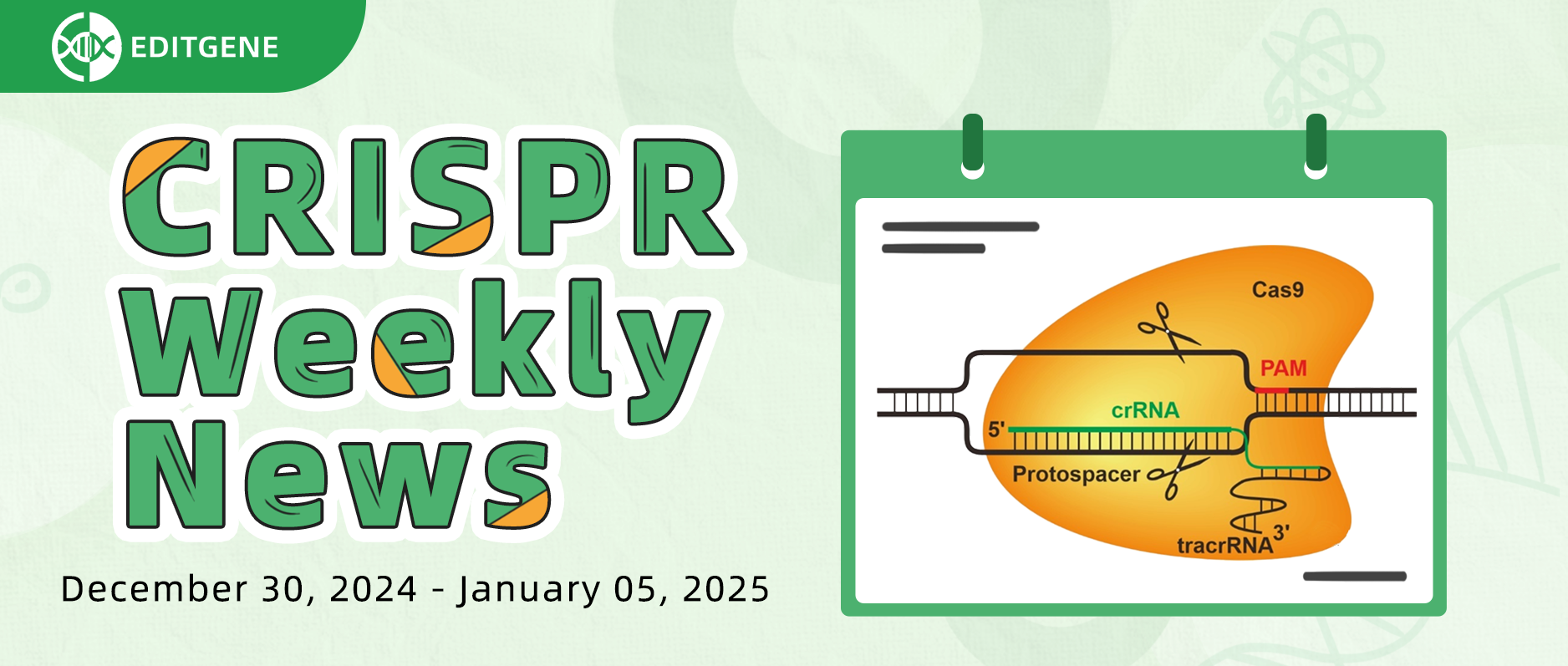[Weekly News] Breakthrough in Gene Editing: Overcoming Immunogenicity with Cas Enzyme Mutants
CRISPR/Cas9

CRISPR/Cas technology is a revolutionary tool in modern biological sciences, with applications spanning medicine, agriculture, environmental conservation, and more. New findings and case studies continue to emerge across these fields. Our‘CRISPR Weekly News’column brings you the latest research and industry updates. Here's a brief summary of the past week's highlights:
I. Research Updates
1. Title: Inhibition of METTL14 Overcomes CDK4/6 Inhibitor Resistance Driven by METTL14-m6A-E2F1 Axis in ERα-positive Breast Cancer
Journal: Journal of Nanobiotechnology (IF: 10.6)
Original Link:https://doi.org/10.1186/s12951-024-03021-2
CDK4/6 inhibitors are widely used in the treatment of ERα-positive breast cancer, significantly improving clinical outcomes. However, the development of resistance remains a major obstacle. To explore the molecular mechanisms of CDK4/6 inhibitor resistance and identify new therapeutic targets and strategies, researchers from the China conducted a CRISPR screening study.
The results not only revealed the key role of METTL14 in resistance but also identified a new METTL14 inhibitor, WKYMVM, which significantly restores sensitivity to CDK4/6 inhibitors. This discovery provides new insights into CDK4/6 inhibitor resistance and offers important guidance for the development of novel treatment strategies with significant clinical application potential.
2. Title: Circulating Tumor Cell Plasticity Determines Breast Cancer Therapy Resistance via Neuregulin 1-HER3 Signaling
Journal: Nature Cancer (IF: 23.5)
Original Link:https://doi.org/10.1038/s43018-024-00882-2
Metastasis of breast cancer is a major cause of patient mortality, with circulating tumor cells (CTCs) considered the source of tumor metastasis. CTCs are relatively sparse in blood, making the study of their biological characteristics and functions crucial for understanding the metastatic process and developing new therapeutic approaches.
To this end, a research team from Germany established long-term CTC-derived organoids from metastatic breast cancer patients and, through multi-omics analysis and preclinical models, discovered that the NRG1-HER3 signaling pathway plays a critical role in the survival, growth, and dissemination of CTCs. Additionally, the study revealed that the FGFR1 signaling pathway compensates in the absence of NRG1, and activation of NRG1-HER3 results in resistance to FGFR1 inhibition. These findings not only offer new insights into the metastatic mechanisms of breast cancer but also provide potential targets for developing precision therapeutic strategies aimed at CTCs.
3. Title: Nucleus-translocated GCLM Promotes Chemoresistance in Colorectal Cancer Through a Moonlighting Function
Journal: Nature Communications (IF: 14.7)
Original Link:https://doi.org/10.1038/s41467-024-55568-1
Colorectal cancer is one of the most common malignancies worldwide. Although chemotherapy based on oxaliplatin is a major treatment approach, chemoresistance remains a primary cause of treatment failure. Metabolic reprogramming is a hallmark of malignant tumors, and metabolic enzymes may not only perform their classical functions but also influence tumor resistance through non-canonical or "moonlighting" functions.
This study reveals a novel role of GCLM, a key enzyme in glutathione synthesis, in colorectal cancer. It was found that GCLM, through its atypical function in the nucleus, enhances NF-κB activity by competitively binding with the NF-κB inhibitor NKRF, thus promoting chemoresistance to platinum-based chemotherapy drugs. Moreover, GCLM translocates into the nucleus under platinum drug treatment through phosphorylation mediated by the P38 MAPK pathway. These findings provide new insights into the mechanisms of chemoresistance in colorectal cancer and potential targets for developing novel therapeutic strategies.
1.Title: Short-Time Preamplification-Assisted One-Pot CRISPR Nucleic Acid Detection Method with Portable Self-Heating Equipment for Point-of-Care Diagnosis
Journal: Analytical Chemistry (IF: 6.7)
Original Link:https://doi.org/10.1021/acs.analchem.4c05026
This article presents a novel, rapid, portable, and highly sensitive diagnostic method for detecting infectious diseases, particularly respiratory infections. The researchers combined recombinase polymerase amplification (RPA) and CRISPR-Cas12a technology to develop a short-time preamplification-assisted nucleic acid detection method called SPOC. SPOC enables rapid and stable detection of as low as 1 copy/μL of SARS-CoV-2 RNA without compromising sensitivity.
By wrapping paraffin with a specific melting point on the surface of lyophilized CRISPR reagents and incorporating a self-heating pouch design, a low-cost and time-saving diagnostic system was achieved. The system, integrating RNA extraction-free technology, enables the "sample-in, result-out" detection of the SARS-CoV-2 Orf1ab gene within 22 minutes via smartphone imaging. Validation results on 12 clinical samples showed complete consistency with real-time polymerase chain reaction, making it suitable for point-of-care rapid diagnostics in resource-limited environments.
2.Title: Dual Signal Amplification in ECL Biosensors: A Novel Approach for Argonaute2 Detection Using SAHARA CRISPR-Cas12a Technology
Journal: Bioelectrochemistry (Amsterdam, Netherlands) (IF: 4.8)
Original Link:https://doi.org/10.1021/acs.analchem.4c05026
Argonaute 2 (Ago2) plays a crucial role in gene silencing, and its activity is an important biomarker for various diseases, including cancer and viral infections. Traditional methods for detecting Ago2 activity are often complex and lack sensitivity and specificity. This study developed a biosensor that combines electrochemical luminescence (ECL) technology with the SAHARA (Split Activator for Highly Accessible RNA Analysis) CRISPR-Cas12a system to detect Ago2 activity with high sensitivity and specificity. By introducing blocking RNA to enhance CRISPR-Cas12a specificity and employing RISC-assisted and CRISPR-Cas12a-mediated dual signal amplification strategies, the sensitivity of the biosensor was improved. The ECL biosensor achieved a detection limit of 0.145 fmol, demonstrating excellent precision, stability, and specificity, making it a powerful tool for detecting Ago2 activity in clinical diagnostics and research.
iii. Other CRISPR-Related Research
1. Title: Rational Engineering of Minimally Immunogenic Nucleases for Gene Therapy
Journal: Nature Communications (IF: 14.7)
Original Link:https://doi.org/10.1038/s41467-024-55522-1
The CRISPR-Cas system, a promising gene editing technology, exhibits both cellular and humoral immunogenicity, which limits its clinical application. Therefore, reducing the immunogenicity of gene editing tools to effectively evade immune detection has become a critical challenge for clinical use. Recently, a team of researchers explored a method to minimize the immunogenicity of gene editing tools through rational design. By conducting MHC-related peptide mass spectrometry (MAPPs), potential immunogenic epitopes were identified in two clinically relevant nucleases, SaCas9 and AsCas12a.
Using computational modeling, mutant variants were designed to escape immune responses. These mutants maintained the wild-type activity and specificity while significantly reducing affinity for MHC molecules and minimizing the generation of cytotoxic T cell responses. In in vivo experiments, the SaCas9 mutant demonstrated similar efficiency to the wild-type when editing the PCSK9 gene, while significantly reducing adverse immune responses. This study provides new strategies and methods for developing safer CRISPR gene editing therapies, with significant clinical application potential.
2. Title: The Interleukin-6 Signal Transducer Receptor Subunit is Required for Optimal In Vitro Bovine Embryo Development
Journal: Biology of Reproduction (IF: 3.1)
Original Link:https://doi.org/10.1093/biolre/ioaf006
To investigate whether bovine embryo development depends on the signaling of the interleukin-6 (IL6) cytokine family, a research team explored its role by inhibiting the interleukin-6 signal transducer (IL6ST). Using the drug inhibitor SC144 and CRISPR-Cas9 technology, they found that partial or complete blockade of IL6ST signaling significantly impacted embryo development up to the 16-cell and blastocyst stages, and reduced the number of inner cell mass (ICM) cells. Moreover, these signals were crucial for the overall cellular organization of the blastocyst. This study highlights the importance of IL6 family signaling in bovine embryo development and provides new insights into the molecular mechanisms of embryo development.
II. Industry News
1. On December 30, Novartis announced positive results from its Phase III STEER study, which evaluated the efficacy and safety of OAV101 IT (intrathecal onasemnogene abeparvovec) in treatment-naive patients with spinal muscular atrophy (SMA) type 2 aged 2 to 18 years. The study results showed that, compared to the placebo group, patients treated with OAV101 IT demonstrated significant improvement in the Hammersmith Functional Motor Scale Expanded (HFMSE) scores from baseline, indicating enhanced motor function. Novartis plans to share these data with regulatory authorities in 2025, with the aim of bringing OAV101 IT to market.
2. Sirius Therapeutics announced that its novel siRNA therapy SRSD216 has received clinical trial application (IND) approval from the National Medical Products Administration (NMPA) in China. SRSD216 is designed for the treatment of hyperlipoproteinemia(a), a condition closely associated with atherosclerotic cardiovascular disease (ASCVD). Preclinical studies demonstrated its excellent drug efficacy duration and good safety profile, with the potential to make significant advancements in ASCVD prevention.
EDITGENE focuses on CRISPR technology,offering a range of high-quality gene editing services and in vitro diagnostic products. These include but are not limited to:CRISPR Library Screening,Cell Line Engineering,Monoclonal Cell Line Screening,CRISPR Detection. We are committed to providing the most efficient technical services for CRISPR-related,gene function research,in vitro diagnostics,and therapeutic research.
Recent Blogs
2. [Weekly News] CRISPR-StAR: High-Resolution Genetic Screening Innovation
Follow us on social media
Contact us
+ 833-226-3234 (USA Toll-free)
+1-224-345-1927 (USA)
info@editxor.com
















